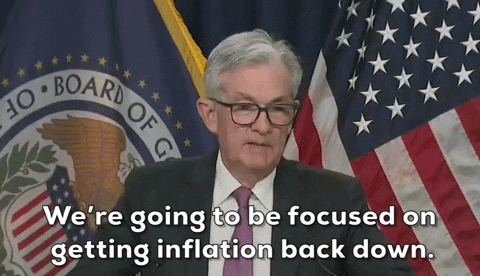THESE RATE HIKES ARE GHETTO!!!!

As an individual or a business owner, federal rate hikes can have a significant impact on your financial planning and decision-making. The Federal Reserve (the "Fed") sets interest rates in the United States to manage the economy, and when the economy is doing well, the Fed raises interest rates to prevent inflation. When the economy is not doing well, the Fed lowers interest rates to encourage borrowing and spending.
Let's explore some strategies to navigate federal rate hikes.
Stay informed: The first and most crucial step in navigating federal rate hikes is to stay informed. Keep an eye on the news and regularly check for updates on the Fed's decisions. The Fed holds regular meetings to discuss interest rates and other economic policies. Pay attention to the language they use in their statements, as it can give clues about future rate hikes.
Evaluate your debt: When interest rates rise, borrowing becomes more expensive. If you have debts with variable interest rates, such as credit card balances or adjustable-rate mortgages, you may want to consider paying them down or refinancing them with a fixed-rate loan. This way, you can avoid paying higher interest rates in the future.
Consider investing in fixed-income securities: Fixed-income securities, such as bonds, can be an excellent investment option during times of rising interest rates. These securities offer a fixed rate of return, which means that when interest rates rise, their value goes up. Consider investing in high-quality corporate bonds or government bonds to earn a steady return while minimizing your exposure to risk.
Adjust your investment portfolio: When interest rates rise, stocks and other assets that are sensitive to interest rates can become more volatile. Consider rebalancing your investment portfolio to reduce your exposure to these assets. Invest in stocks that are less sensitive to interest rate changes, such as consumer staples or healthcare, and avoid stocks that are more sensitive, such as financials.
Stay diversified Diversification is essential when navigating federal rate hikes. Spread your investments across different asset classes and industries to reduce your risk exposure. Investing in a mix of stocks, bonds, and cash can help you weather changes in the interest rate environment.
Thought I was going to leave you hanging? Here's a list of fixed-income securities to invest in!
Treasury bonds: These are issued by the U.S. government and are considered the safest fixed-income investment. They offer a fixed rate of return over a set period, usually ranging from two to thirty years.
Municipal bonds: These are issued by state and local governments to fund projects such as schools, roads, and hospitals. They offer tax-free income to investors and are a popular choice for high-net-worth individuals.
Corporate bonds: These are issued by companies to raise capital for operations, expansion, and acquisitions. They offer a higher rate of return than government bonds but come with higher risks.
Certificates of deposit (CDs): These are issued by banks and offer a fixed rate of return over a set period. They are FDIC-insured, which means that the investor's principal is guaranteed up to a certain amount.
Preferred stocks: These are a hybrid between stocks and bonds and offer a fixed dividend payment. They are less volatile than common stocks and can provide a stable source of income.
Ready to take control of your finances? Consider this your official invite to Register for the FREE Wealthy Woman Webinar this Thursday! Click the button below to register and we'll see you live in class!